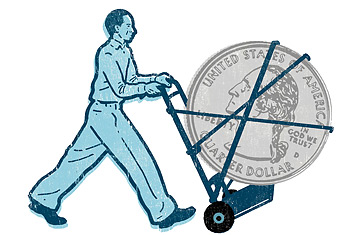
Conventional investing wisdom says to gird for a recession by buying the stocks of big companies in industries like health care, utilities and consumer staples—the things that people can't avoid buying, even in a downturn. But loading up on these so-called noncyclical stocks won't necessarily save your portfolio. "A recession affects everything," says Lakshman Achuthan, managing director of the Economic Cycle Research Institute. "By definition, it's pervasive."
Sam Stovall, chief investment strategist at Standard & Poor's, recently looked at the performance of large-cap stocks before and during the 10 recessions we've had over the past 60 years. Stocks dropped, on average, 21%, and while defensive plays bested other stocks 80% to 90% of the time, they still suffered: consumer staples were down 2.4%, health care dropped 7.3%, and utilities fell 15%. The only three true bright spots—stocks that actually gained ground during a recession—were tobacco, household products and alcoholic beverages. "When the going gets tough," says Stovall, "the tough get eating, smoking and drinking."
The data also challenged the idea that big companies weather downturns better. In two of the past four recessions (1981-82 and 2001), small-cap stocks, as measured by the Russell 2000, outperformed large caps; that is, in a rocky market, they didn't plunge as far.
So what's the best strategy now that the market has fallen more than 8% since early October? Because growth is stronger in some parts of Asia and Europe, it may make sense to rotate into companies that have a large chunk of sales coming from overseas. Yet Ned Notzon, chairman of the asset-allocation committee at investment firm T. Rowe Price, cautions investors against making any drastic moves, especially in accounts set up for retirement or other long-term goals. "Hopefully, you've selected investments where you're broadly diversified and not really upset if one sector of the market does poorly," he says.
If you are tempted to trade, there's still that pesky problem of getting in and out at exactly the right time. The market declines of the past 11 recessions have lasted, on average, just 8.6 months, with some coming and going in as little as 90 days. And even though stocks have always dropped going into a recession, don't assume that the current slide is a sure sign of things to come. Since 1945, the market has had 75 drops of 5% or more and only 11 recessions.